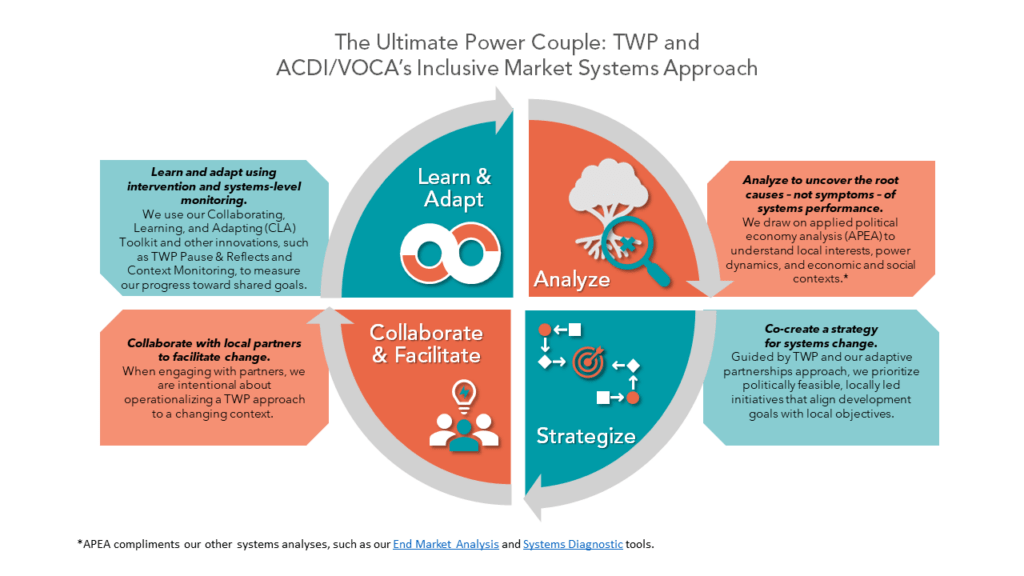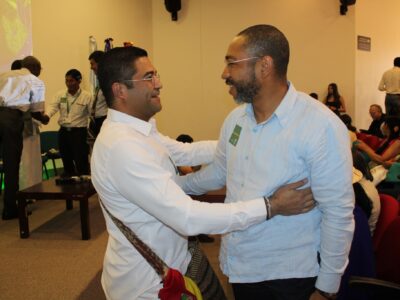
About this series
ACDI/VOCA integrates thinking and working politically (TWP) into our inclusive market systems (IMS) approach to development in a way that facilitates system-level changes that are politically smart and feasible. TWP is an approach of the U.S. Agency for International Development (USAID) and others that stresses the importance of understanding the local context (“thinking politically”) to help communities create sustainable change (“working politically”). After all, a community is heavily influenced by its local interests, values, power dynamics, and motivations. TWP recognizes the power politics have on which technical approaches work and which do not.
As such, TWP requires a few things: (1) strong political analysis, insight, and understanding; (2) responsiveness to the local context, including by working with and through local stakeholders; and (3) flexibility and adaptability in program design and implementation. These principles are readily integrated into the four phases of ACDI/VOCA’s IMS approach: (1) analyze; (2) strategize; (3) collaborate and facilitate; and (4) monitor, evaluate, learn, and adapt. (Read more about our approach below.) Each phase guides smart, dynamic, locally owned, and sustainable systems change. Part of our IMS approach is also to consider local power dynamics and political economy forces within the systems we aim to improve so that we prioritize politically feasible, locally generated initiatives with the highest likelihood of effectiveness and sustainability.
We are pleased to contribute to the growing body of evidence on the importance of politically aware and adaptive development. For our own organizational learning and to improve our programs’ outcomes, we conducted a series of case studies on locally-led approaches to TWP in Colombia, Ghana, and Mozambique.
Afro-Colombian Empowerment
The first case comes from the Indigenous Peoples and Afro-Colombian Empowerment (IPACE) Activity, funded by USAID and implemented by ACDI/VOCA in Colombia. In May 2024, this case was named a finalist in the inaugural TWP Case Competition run by USAID’s Bureau for Democracy, Human Rights and Governance.
IPACE employed coalition building, consultative processes, capacity strengthening, and policy reform as pathways to empower Afro-Colombians and create lasting, systems change. Learn more in the following case study.
Afro-Colombian Empowerment through the Regulation of Law 70
How a 1993 Law Failed to Deliver on Promises to Afro-Colombian Peoples
Colombia’s 1991 Constitution recognized the country as multiethnic and multicultural. In 1993, the government passed Law 70, which recognized the rights of Afro-Colombian peoples to collective land ownership and emphasized sustainability, culture, and ancestral knowledge. Despite this momentum, three decades passed without the issuance of implementing regulations for Chapters IV and V of the law, which deal with environmental and mining issues respectively.
The lack of implementing regulations hindered the ability of Afro-Colombian communities to make decisions related to mining and other business activities with environmental impacts in their territories. With the election of a new government in 2022, the issue of Afro-Colombian self-determined development found a champion in Colombia’s first Afro-Colombian Vice President, Francia Márquez.
Restarting the Conversation in 2022 with Colombia’s First Afro-Colombian Vice President
The IPACE Activity followed a multi-pronged, politically informed approach. The IPACE Activity facilitated dialogue between the Vice Presidency and relevant ministries to develop a consultation process with the Afro-Colombian population, all while supporting ministries in adopting a differential approach to policymaking that considers the population’s diverse needs. The IPACE Activity also partnered with Afro-Colombian organizations to strengthen their competencies in coalition building and advocacy, including the IPACE-supported formation of the Juntanza Council, comprised of ethnic organizations. Through this council, local actors built a productive space for dialogue on common issues, collaboration, and knowledge exchange, which fostered improved relationships and networks for coordinated action.
New, Improved Regulations Benefit Afro-Colombian Populations
The coalition building, consultative processes, and capacity strengthening resulted in approved regulations that empower Afro-Colombian communities: Chapter IV regulations established rules for land use and the protection of natural resources, recognizing territorial management by Afro-Colombian communities. Chapter V regulations adopted mechanisms to develop mining activities sustainably in the territories. Chapter V also obliges Colombian ministries to allocate a budget to support the implementation of these regulations.
These new regulations represent a crucial achievement for the recognition of Afro-Colombian rights, positioning Afro-Colombians as prominent players in national development plans and elevating the importance of the relationship between Afro-Colombians and the environment.
Learn more about the IPACE Activity here and here.
Stay tuned for more case studies from Ghana and Mozambique!
Digging Deeper: How We Integrate TWP into a Market Systems Approach
For years, ACDI/VOCA has integrated TWP into its IMS approach to drive broad-based, sustainable impact. First, we analyze, looking beyond the symptoms of poor system performance to uncover the root causes. We draw on USAID’s guidance for TWP through applied political economy analysis (APEA) to understand the interests of local stakeholders, power dynamics, and economic and social forces that influence how a system works. APEA compliments other systems analysis, like our Systems Diagnostic and Gender, Youth and Social Inclusion Analysis, to enhance our understanding of the system from multiple perspectives.
Then, we jointly strategize with local partners on ways to drive systems change with scale and sustainability. We align our resources and collaborate and facilitate with local partners, especially marginalized groups, to facilitate that change. ACDI/VOCA integrates TWP tools and perspectives throughout implementation, such as during partnership identification and engagement processes, to consider the power dynamics and help operationalize a TWP approach to a changing context more intentionally.
Along the way, we monitor, evaluate, learn, and adapt, as we discover new information. We leverage ACDI/VOCA’s Collaborating, Learning, and Adapting (CLA) Toolkit and other innovative methods, such as TWP Pause and Reflects, to measure progress toward achieving joint objectives with our local partners and target groups.
View the infographic below for how we integrate TWP into our systems approach:

Learn more about the IPACE Activity.
Read the second and third cases, featuring projects from Ghana and Mozambique
For questions, comments, or inquiries, please contact Ydun Donahoe (ydonahoe@acdivoca.org).
Comments






